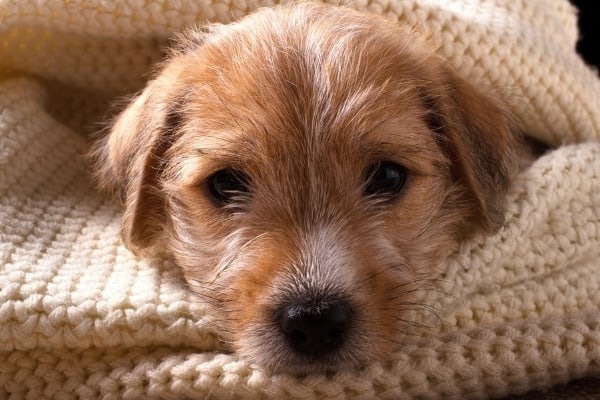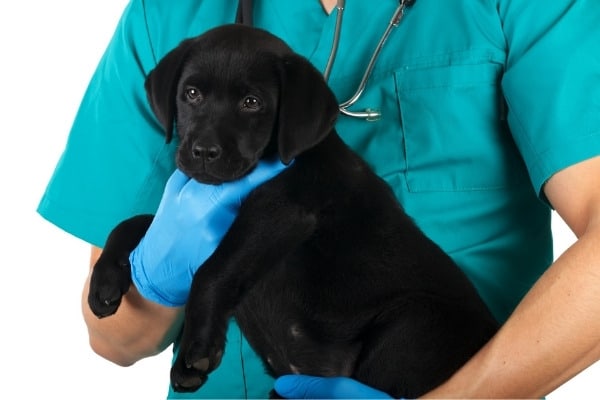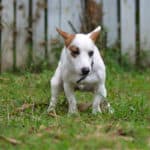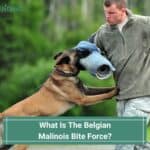
If your dog has been diagnosed with and treated for parvo, it can be very alarming if your recovering pup doesn’t want to eat upon returning home from hospitalization.
Your first instinct may be to force him to eat, but this can cause more harm than good.
Should I force-feed my dog with parvo? If your dog has parvo, you should encourage him to eat but do not force-feed as this could worsen his condition or cause choking. You can offer a variety of bland food throughout the day, such as boiled chicken, rice, oatmeal, and cooked eggs. Hydration is very important, so offer water frequently.
Force-feeding could make your dog throw up, which could lead to dehydration and a weakened state.
There are other treatment options that are better suited for ensuring your dog recovers properly.
If your dog has parvo and you are worried about how you will help him recover, read on to learn more about how this illness affects dogs and what you can do during the recovery process.
Feeding Dogs Recovering From Parvo
While your dog is recovering from parvo, he will likely still have a sensitive stomach and may not be able to hold down certain foods.
It’s best to feed a bland diet that consists of foods that are easily digestible.
What To Expect Following Hospitalization
Your dog may not have much of an appetite following hospitalization and may only eat small amounts of food or refuse to eat at all.
Continue to offer your dog fresh food and water several times a day. You can also expect your dog to be lethargic and even borderline dehydrated.
It can take up to a week before your dog regains his appetite and even longer before he regains his energy.
Hydration Is Key
Parvo causes dogs to lose a lot of fluids, so they will likely be severely dehydrated, even when recovering if they do not drink regularly.
Encourage your dog to drink as much as possible. This will help prevent other complications and allow him to recover faster.
What To Feed a Puppy With Parvo
You should feed your dog a bland diet of foods that can help soothe the stomach and will be easy to digest.
Offer your dog scrambled eggs, oatmeal, white rice, and boiled chicken.
Your dog may prefer some options over the others, and you should continue to feed your dog this diet until his appetite improves.
When in doubt, please consult your vet immediately.
How To Encourage a Dog With Parvo To Eat
The best way to encourage a dog with parvo to eat is to offer small amounts of different foods at a time.
The dog may simply taste each food out of curiosity, which will give him a small amount of nutrition to help fight off the virus. Continue to offer water to your dog as well.
Why Force Feeding Can Be Dangerous
When you force a dog or puppy to eat, you always risk the chance of him choking or aspirating (getting food in the lungs). This can be deadly for some dogs.
Force-feeding a sick dog can also make him more likely to throw up, which can dehydrate the dog even further.
Dogs will not understand why you are force-feeding them and will likely be terrified of the ordeal, which will only exacerbate the food aversion they are experiencing.
Consult Your Vet If Your Dog Is Not Eating

If your dog is recovering from parvo and isn’t eating, you should contact your veterinarian.
The vet may be able to offer solutions that can help encourage the dog to eat or may even ask you to bring your dog back to the hospital so he can be given IV therapy so he does not become dehydrated and has the proper nutrients he needs to recover properly.
Egg Yolk for Parvo – What To Know
Many veterinarians recommend feeding your dog eggs or egg yolks when recovering from parvo.
Egg yolks contain immunoglobulins and colostrum, which can help remove the virus from the body faster so your dog is less likely to become dehydrated or experience more severe symptoms.
Egg yolks are also a good source of protein and can help your dog gain weight and recover from the illness faster.
Average Parvo Recovery Time
On average, it takes a dog five to 10 days to recover from parvo. It can take young puppies and older dogs with other health conditions even longer.
There is no cure for the virus, and it must run its course.
Parvo Day By Day
|
Day |
Observations |
|
1 |
Lethargy, no appetite |
|
2 |
Lethargy, vomiting, bloody diarrhea, no appetite |
|
3 |
Lethargy, vomiting, bloody diarrhea |
|
4 |
Vomiting and diarrhea start to subside, appetite starting to return, lethargy |
|
5-7 |
Appetite starting to return, energy improving |
|
8-10 |
Gaining weight, appetite almost normal, energy level almost normal |
|
Second week |
Appetite is back to normal, energy level is normal |
|
Third week |
Dog appears to be fully recovered |
Related Questions:
How Much Does Parvo Treatment Cost?
Parvo treatment can range from $300 to $5,000, depending on the severity and the veterinarian treating the dog. Treatment focuses on keeping the dog comfortable and hydrated.
Not all pet owners can afford these costs and many choose to provide comfort and care at home after confirming the diagnosis with a vet, but this is not recommended.
How To Fatten Up a Dog After Parvo?
It’s normal to want to see your dog gain weight and recover quickly after parvo, and he will naturally once his appetite returns.
You can help by encouraging your dog to eat small, healthy meals often. Offer your dog different food options to find one he enjoys and will willingly eat on his own.
Conclusion
Watching your dog struggle with parvo can be terrifying.
You can take your dog to a veterinarian for treatment (by far, this is the best choice), or you can treat your dog at home, though the risks of him surviving drop dramatically.
Once your dog is on the road to recovery, do not force-feed your dog. Instead, encourage him to eat and drink on his own as much as possible.
As your dog recovers, continue to offer small meals several times throughout the day until the appetite returns to normal.




